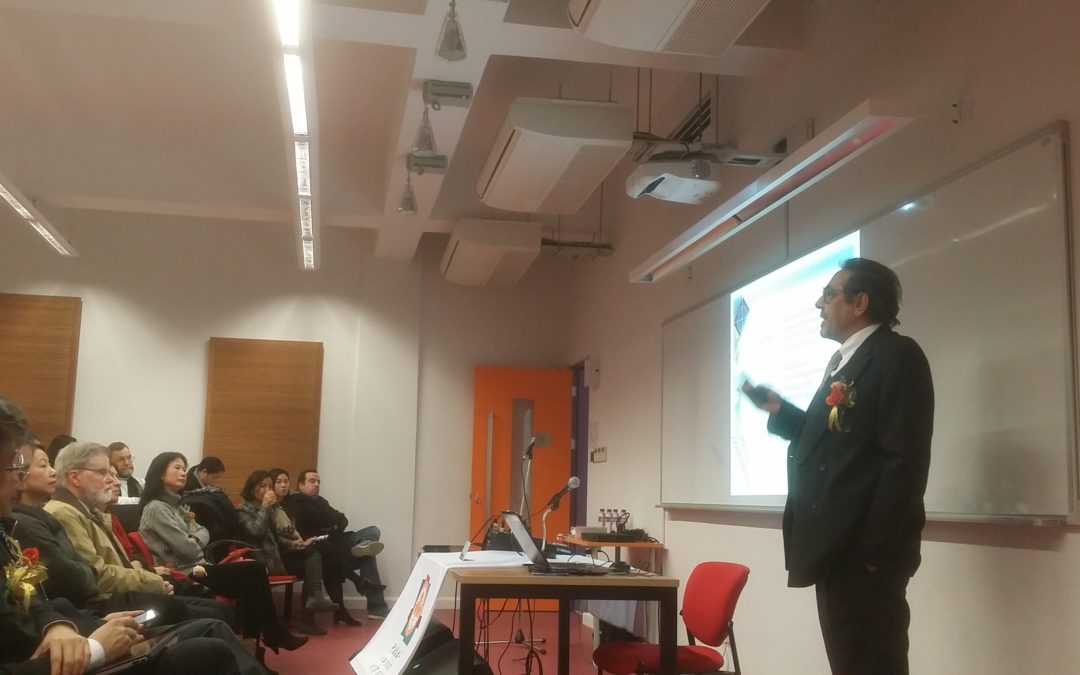
‘SELF-REGUALTED LEARNING’
On January 6th over 150 Principals, Teachers, textbooks publishers and other experts in the field of education made their presence at the conference organized by the University of Saint Joseph, under the theme “Self-Regulated Learningâ€. The Director of Education Mr. Lo Pak San, the Rector of the University Fr. Peter Stilwell and representatives from Taiwan and Hong Kong were among the main guests.
The Seminar was opened with the address from the Rector of the University and Ms. Ana Corea, Dean of the Faculty of Education, followed by the lectures of the four speakers. Our brother, Fr. Alejandro Salcedo was one among the lectures, with his presentation “Self-Regulated Learning: Exploring the Emerging Use of Flipped Learningâ€.Â
 Fr. Alejandro Salcedo, Principal of Saint Paul School, and with over 30 years of experience in the field of education, made a review of the present educational system and the need for a change in our classrooms. With his opening statement “if we do what we have always done, we will get the result we have always got†draw the attention of the audience and brought them through the journey of our schools present reality and the need to do “more, better and different†for a better future. “An education without vision is a future without hope†Fr. Alejandro Salcedo said. While big changes and development have taken place in other fields of our society (e.g. industry, health, ICT, etc.) our education system is still much the same as 30 or 40 years ago, when the main role of learning and teaching was based on the “transmission of information rather than the inner-formation, bread and money oriented rather than life oriented and with emphasis on theoretical knowledge rather than on practical skills, and where memorization was more important than understandingâ€.
Fr. Alejandro Salcedo, Principal of Saint Paul School, and with over 30 years of experience in the field of education, made a review of the present educational system and the need for a change in our classrooms. With his opening statement “if we do what we have always done, we will get the result we have always got†draw the attention of the audience and brought them through the journey of our schools present reality and the need to do “more, better and different†for a better future. “An education without vision is a future without hope†Fr. Alejandro Salcedo said. While big changes and development have taken place in other fields of our society (e.g. industry, health, ICT, etc.) our education system is still much the same as 30 or 40 years ago, when the main role of learning and teaching was based on the “transmission of information rather than the inner-formation, bread and money oriented rather than life oriented and with emphasis on theoretical knowledge rather than on practical skills, and where memorization was more important than understandingâ€.
“It may be true that our classrooms are equipped with 21st-century gadgets, but they are sitting in a 20th-century learning and teaching environmentâ€, he said. We need to go beyond the skills of the 20th century to be productive in the 21st. century. There is an urgent need to change from “conformity learning to divergent thinking. We need to be different, think different, speak different, expect different, perceive different. We need not to work harder but smarterâ€, Fr. Alejandro alleged.
With globalization skills have become more important than qualifications and we will be as good as the skills we possess, and how well we do things. Teaching and learning must be seen from the 21st-century point of view, “teaching must be inspiring change rather than imparting knowledge, and learning acquiring understanding rather than absorbing facts. The education of our future generation is not a video game where we have several lives; in our classrooms we only have one chance, either we succeed or fail, either we learn from success or from failure, so we must do the right thing and do the thing right.
We do not have to work harder, we need to work smarter
 We live in an age of uncertainty Fr. Alejandro said, where according to statistics robots will replace 800 million jobs by 2030 and where traditional career paths are on the way out. “The past is a place to learn from and not a place to live inâ€, Fr. Alejandro asserted, therefore, “we have to initiate and determine the nature of the future by giving direction and purpose to the present educationâ€. As Fr. Alejandro said and I quote: “if we want to have something that we never had we have to do something that we never have doneâ€, we need to implement a pedagogical approach in our education system where direct instruction moves from the groups learning space to the individual learning space, and the resulting group space is transformed into a dynamic, interactive learning and teaching environment and where the teacher is not the ‘sage on the stage’ but the ‘guide on the side.
According to Fr. Alejandro, “an educational strategy without vision in the future will make us always return to the pastâ€. Now more than ever, he continued, “need to form skills in our younger generation where machines cannot compete with us ….we have to instill in the future leaders minds capable to analyze, evaluate, create, compare and contrast, judge and assess, investigate, choose and analyze. We must flip our learning environment from the traditional course-centric model to the learner-centric approach. We need to flip that traditional learning environment by delivering academic content outside the class and use the class time for discussion and application.† This, according to Fr. Alejandro, is the baseline of flipping learning.
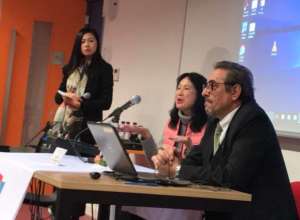 In today’s world it is not enough for our younger generation to be passive learners, receiving, undemanding and repeater minds but “active learners, owners of their learning, questioners, they need to be engaged and motivated towards a lifelong learning.†The classical setting of a classroom is all about the teacher and the teacher’s needs. All the tools are for the use of the teacher, thus, the student becoming a merely passive receiver of information.Â
In today’s world it is not enough for our younger generation to be passive learners, receiving, undemanding and repeater minds but “active learners, owners of their learning, questioners, they need to be engaged and motivated towards a lifelong learning.†The classical setting of a classroom is all about the teacher and the teacher’s needs. All the tools are for the use of the teacher, thus, the student becoming a merely passive receiver of information.Â
“We need to overturn the traditional model by moving away from teacher centered space into a more collaborate student-centered learning environment, an environment where the student initiates the learning and the teacher the teacher becomes a facilitator and advisor.â€
No one puts a piece from a new garment on an old one or new wine into old wineskins (Lk. 5:36-39). “I see and I forget, I hear and I remember, I do and I understand†(Chinese Proverb). “We do not have to do different things, we have to do things differently†he said. Flipping learning is not a ‘magic bullet’; it is the first step in reframing the role of the teacher and the student in the classroom. Flipping our learning environment is a win-to-win situation for both students and teachers and the society as a whole. By doing the right thing now, it will be more difficult for the younger generation to take the wrong choice in the future†he concluded.
The Editor

Abstract
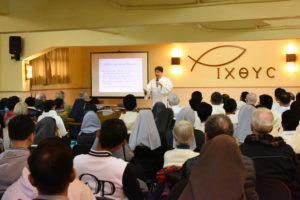 This lecture is an attempt to trace the evolution of the concept of wisdom as found in the thought of Aristotle and Aquinas. This is done in terms of how the Greek concept of wisdom as an intellectual virtue is understood and used to express the Christian concept of wisdom as a gift of the Holy Spirit. The main aim is to understand how Aquinas derived the concept of wisdom from Aristotle’s philosophy and developed it in his theology.
This lecture is an attempt to trace the evolution of the concept of wisdom as found in the thought of Aristotle and Aquinas. This is done in terms of how the Greek concept of wisdom as an intellectual virtue is understood and used to express the Christian concept of wisdom as a gift of the Holy Spirit. The main aim is to understand how Aquinas derived the concept of wisdom from Aristotle’s philosophy and developed it in his theology.
The study is based on Book 6 of Aristotle Nichomachean Ethics and Question 45 of the second part of the second part of Aquinas Summa Theologiae. It concludes with a reflection on the relationship between wisdom and happiness.
Edmond Eh Kim Chew, OP
The Human-Animal Boundary
   University of Macau
      27-28 Nov 2015
 The boundary between humans and non-human animals has been an integral part of philosophical discourse since antiquity. Attempts to draw a boundary between human and nonhuman life has involved the literary imagination as well as philosophical reflection. Throughout the centuries philosophers and poets alike have defended an essential difference – rather than a porous transition – between what counts as human and what as animal. The attempts to assign essential properties to humans (e.g. a capacity for language use, reason and morality) often reflected ulterior aims to defend a privileged position for humans with regard to animals (which were, in turn, interpreted as speechless, irrational and amoral). While this form of humanism has come under attack through animal rights initiatives in recent decades, alternative ways of engaging the human-animal relationship from a philosophical and poetic perspective are rare. The conference thus aims to shift the traditional anthropocentric focus of philosophy and literature by combining the question “what is human?” with the question “what is animal?” to explore productive ways of thinking with and beyond the human-animal boundary.
The boundary between humans and non-human animals has been an integral part of philosophical discourse since antiquity. Attempts to draw a boundary between human and nonhuman life has involved the literary imagination as well as philosophical reflection. Throughout the centuries philosophers and poets alike have defended an essential difference – rather than a porous transition – between what counts as human and what as animal. The attempts to assign essential properties to humans (e.g. a capacity for language use, reason and morality) often reflected ulterior aims to defend a privileged position for humans with regard to animals (which were, in turn, interpreted as speechless, irrational and amoral). While this form of humanism has come under attack through animal rights initiatives in recent decades, alternative ways of engaging the human-animal relationship from a philosophical and poetic perspective are rare. The conference thus aims to shift the traditional anthropocentric focus of philosophy and literature by combining the question “what is human?” with the question “what is animal?” to explore productive ways of thinking with and beyond the human-animal boundary.
Edmond Eh, O.P.
Symposium on Chinese Philosophy 2016,
Singapore-Hong Kong-Macau
29-30 April 2016
 The Singapore-Hong Kong-Macau Symposium on Chinese Philosophy took place on 29-30 April 2016. It aims to foster dialogue and interaction among scholars and advanced graduate students primarily based in Singapore, Hong Kong, and Macau. Topics include any aspect of Chinese Philosophy, as well as papers dealing with comparative issues that engage Chinese perspectives. While preference is given to those from the region, participants from any geographic areas are welcome. Organised and sponsored by the Department of Philosophy, The Chinese University of Hong Kong.
The Singapore-Hong Kong-Macau Symposium on Chinese Philosophy took place on 29-30 April 2016. It aims to foster dialogue and interaction among scholars and advanced graduate students primarily based in Singapore, Hong Kong, and Macau. Topics include any aspect of Chinese Philosophy, as well as papers dealing with comparative issues that engage Chinese perspectives. While preference is given to those from the region, participants from any geographic areas are welcome. Organised and sponsored by the Department of Philosophy, The Chinese University of Hong Kong.
Edmond Eh, O.P.
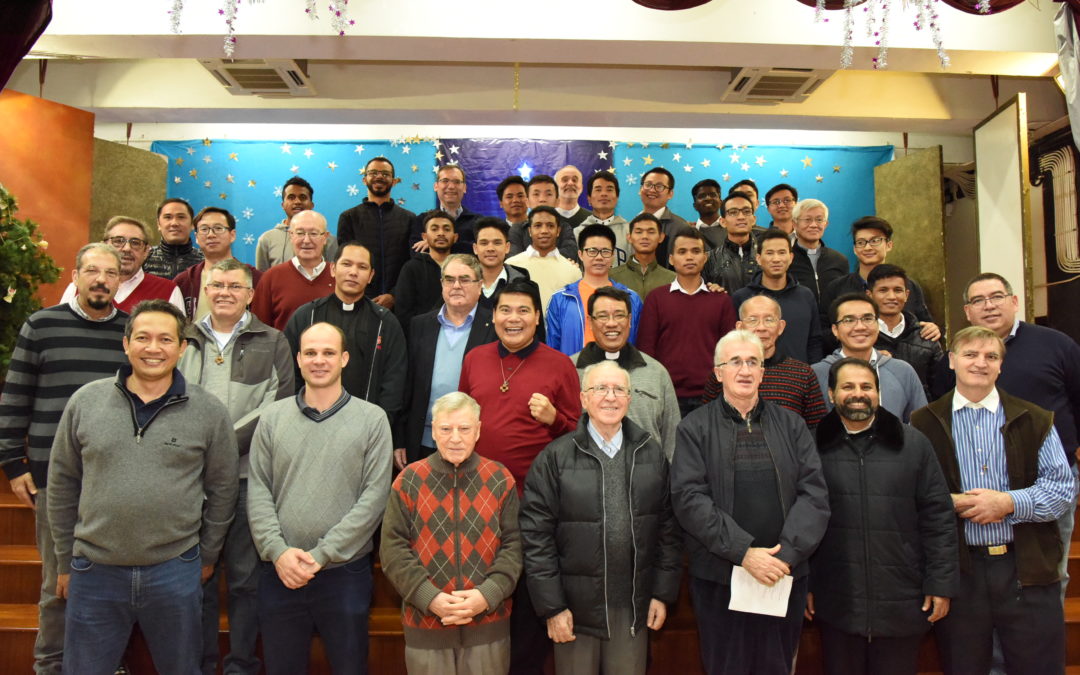
Men Religious from different Orders and Congregations, present in Macau, annually gather together to celebrate the Christmas Feast. Every year in December, different parishes alternatively facilitate venues for them to hold their meeting. This year, the gathering took place in the Church of Our Lady of Fatima Parish, on the 27th of December. Some 50 Religious have participated in the celebration. Most participants are religious priests who are doing their pastoral ministry in Schools and in the Diocese of Macau. Some of the participants are religious brothers who are still in their formation state.
Shortly before the big gathering, which would take place later, Fr. Joseph Angel Castellanos Hernandez (SVD), the parish priest of Fatima Parish, welcomed, at 6:00 pm, all the participants in a small chapel attached to the main Church to begin the evening prayer, led by the Dominican brothers. After the chanting of the psalms, religious priests from different congregations were invited to participate, reading a short scripture passage, leading intercessions and reciting the closing prayer, etc. Right after the closing prayer, the parish priest, together with all participants, warmly welcomed H. E. Bishop Stephen Lee Bun Sang, the bishop of Macau. His presence made the gathering more lively and joyous.
After saying the evening prayer and welcoming the bishop, all participants moved to the social hall of the parish, where all the facilities were arranged beforehand by Fr. James Ho Ngo Lu Vien (SVD), the assistant parish priest. Fr. Andy Vergara, who acted as the coordinator of the gathering, invited everyone to introduce himself, since some new religious, who had been recently assigned in Macau, were present. After that, he requested the bishop to deliver a short Christmas message to the religious who were present in the gathering.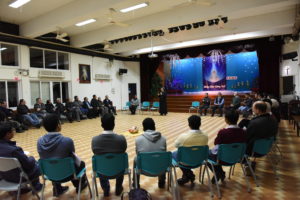
Bishop Stephen Lee began his speech by saying that he was really happy to join the gathering and to see young religious brothers who reminded him of his early age in perusal of his religious vocation like them. The bishop brought up two points as his Christmas message to all the participants: the first message was to bring mercy to everyone, so that in this way, every religious would reach out to the world through his way of life, initiated in themselves and exercised in their communities. The second message concerned the pastoral ministry in the parishes, regarding the upbringing the role of youths and valuing authenticity of family life in the parish. He gave a short evaluation on this second point by saying that the crucial role of the youths in the parish must be recognized by those who minister to the youth, as well as their families. The genuine family life in the Church is important because the good and promising youths are brought up by good families. Putting emphasis in their family life and youths would surely make flourish new vocations in the Church, too. Then, the bishop wished everyone to have a blessed and happy Christmas. The compelling message of the bishop would surely be a powerful stimulus for all participants to begin the coming New Year with a rigorous program.
Afterward, the singing of Silent Night, the famous beautiful Christmas song, in different languages followed, as the religious present belonged to different nationalities. The singing was accompanied by the accordion played by Fr. Angel SVD, and the guitar, played by Bro. Abraham OP. In line with the first message of the bishop regarding Mercy, a Chinese Jesuit priest, sang a Marian song, in honor of Our Lady in this Christmas Feast,.
A fraternal dinner and an animated mutual conversation with one another followed, as the celebration was going on. Throughout the gathering, everyone was happy to celebrate the coming of our Lord by sharing joy, love and hope.
I wish you all a Blessed and Merry Christmas!

Bro. Stephen Saw Lei Kapaw. O.P.
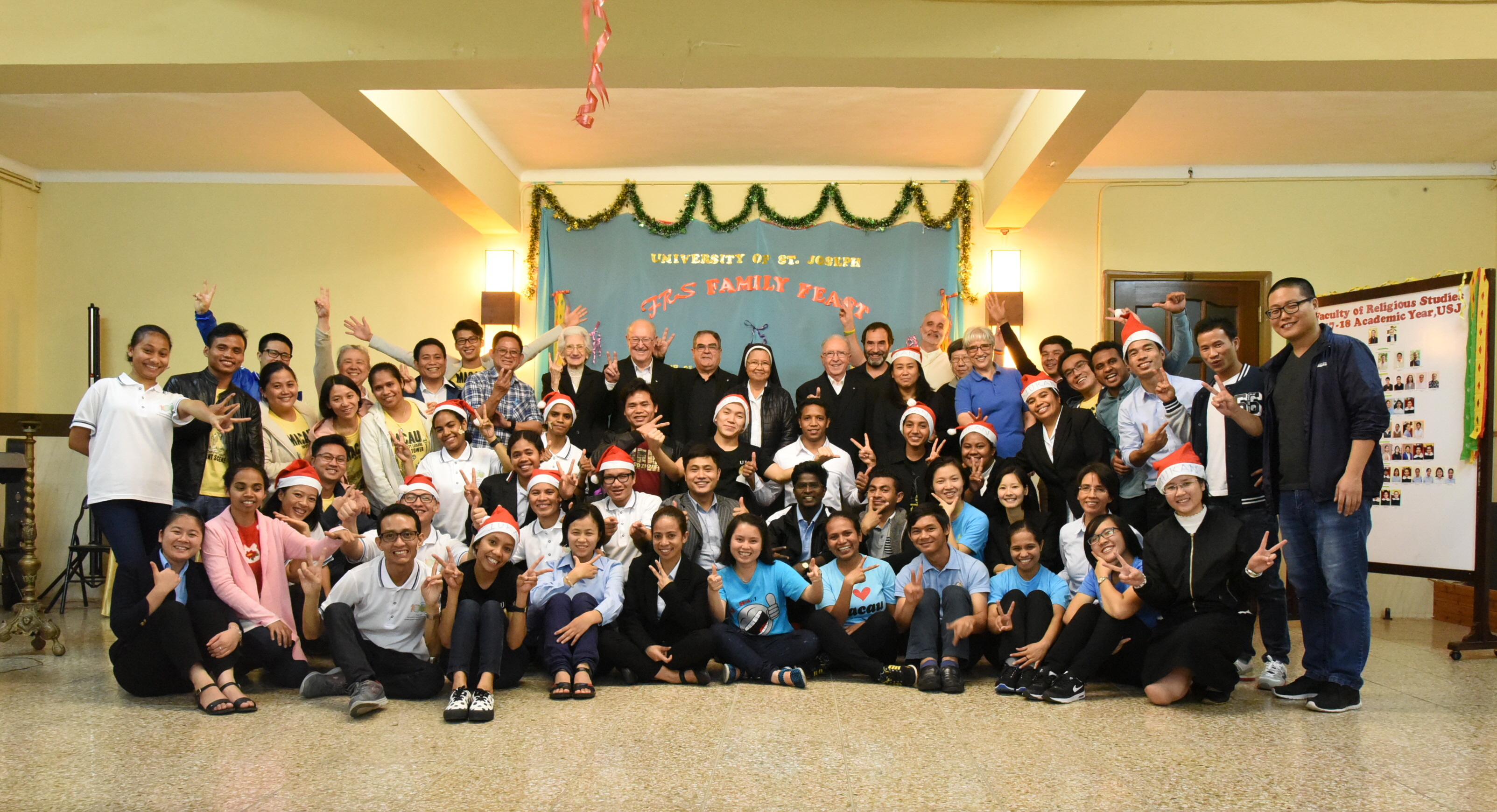
It has been a custom for the Faculty of Religious Studies (FRS) to commemorate the feast day of St. Francis Xavier as a thanksgiving day of the Faculty. It is also a Family Feast Day for the FRS, since St. Francis Xavier is considered the patron saint of the university students in Hong Kong, Macau and some provinces in China. This year, the FRS celebrated their thanksgiving Family Feast on the 1st of December instead of on the 3rd of December, because the feast of St. Francis Xavier happened on the first Sunday of Advent.
In previous years, the occasion begun with the Eucharistic celebration in the evening, then, followed by dinner and some indoor performances by the members of the Faculty. This year, the Family Feast was held in a different and well-organized way. Since the first week of November, all the members in the Faculty, including full time and visiting professors, and some benefactors of the Faculty, were grouped into families such as Matthean Family, Markan Family, Lukan Family and Johannine Family. Then, in the last week of November, before the day of the celebration, these families were asked to participate in some competitions such as singing, dancing, essay writing, spelling contest and Christmas postcard making. Singing and dancing were required to be done by groups in order that all the members of the different families would collaborate together and gain a sense of team spirit.
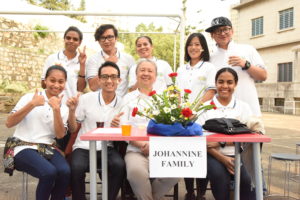
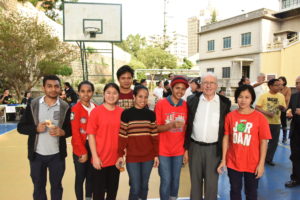
In the afternoon of the day of the celebration, the dean, Doctor Arnold Monera, together with the members of the Student Council of the Faculty, facilitated some light parlor games for all family members in Saint Joseph’s Seminary campus. All the family members cooperated enthusiastically in order to get high scores, because awards for overall scores of all competitions had been prepared beforehand. The parlor games were ended up with mini-football matches, played by female members of the Faculty. Every participant was happy and surprised when they saw that matches were fairly played and conducted in such a joyful and vigorous manner.
The Eucharistic celebration, presided by Fr. Javier González OP, began at 5:30 pm, at Saint Joseph’s Church. Fr. Peter Stilwell, rector of the university, some professor priests, all the members of the Faculty, some religious superiors and friends of the Faculty were present in the Mass. The holy Mass was accompanied by harmonious and beautiful songs interpreted by students of the Faculty. In his homily, Fr. Javier pointed out some important characteristics that St. Francis Xavier possessed, such as a zeal for mission and good attitudes to make known the Good News to all peoples in different walks of life.
A Family agape followed the Mass, and after that, a short indoor performance was opened for all the attendees in the auditorium of Saint Joseph’s seminary. Meanwhile, those who had won first and second prizes in singing and group dancing competitions, were asked to perform again in order to make alive a short entertainment. Afterward, those who won prizes in the contests received the awards by the dean of the Faculty. The Family Feast was concluded with a closing prayer by Fr. José Luis de Miguel OP and the singing of the Salve Regina by all those present.
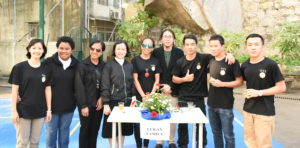
FRS.Family Feast-5
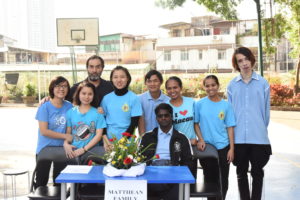

 Fr. Alejandro Salcedo, Principal of Saint Paul School, and with over 30 years of experience in the field of education, made a review of the present educational system and the need for a change in our classrooms. With his opening statement “if we do what we have always done, we will get the result we have always got†draw the attention of the audience and brought them through the journey of our schools present reality and the need to do “more, better and different†for a better future. “An education without vision is a future without hope†Fr. Alejandro Salcedo said. While big changes and development have taken place in other fields of our society (e.g. industry, health, ICT, etc.) our education system is still much the same as 30 or 40 years ago, when the main role of learning and teaching was based on the “transmission of information rather than the inner-formation, bread and money oriented rather than life oriented and with emphasis on theoretical knowledge rather than on practical skills, and where memorization was more important than understandingâ€.
Fr. Alejandro Salcedo, Principal of Saint Paul School, and with over 30 years of experience in the field of education, made a review of the present educational system and the need for a change in our classrooms. With his opening statement “if we do what we have always done, we will get the result we have always got†draw the attention of the audience and brought them through the journey of our schools present reality and the need to do “more, better and different†for a better future. “An education without vision is a future without hope†Fr. Alejandro Salcedo said. While big changes and development have taken place in other fields of our society (e.g. industry, health, ICT, etc.) our education system is still much the same as 30 or 40 years ago, when the main role of learning and teaching was based on the “transmission of information rather than the inner-formation, bread and money oriented rather than life oriented and with emphasis on theoretical knowledge rather than on practical skills, and where memorization was more important than understandingâ€. In today’s world it is not enough for our younger generation to be passive learners, receiving, undemanding and repeater minds but “active learners, owners of their learning, questioners, they need to be engaged and motivated towards a lifelong learning.†The classical setting of a classroom is all about the teacher and the teacher’s needs. All the tools are for the use of the teacher, thus, the student becoming a merely passive receiver of information.Â
In today’s world it is not enough for our younger generation to be passive learners, receiving, undemanding and repeater minds but “active learners, owners of their learning, questioners, they need to be engaged and motivated towards a lifelong learning.†The classical setting of a classroom is all about the teacher and the teacher’s needs. All the tools are for the use of the teacher, thus, the student becoming a merely passive receiver of information. 


 The boundary between humans and non-human animals has been an integral part of philosophical discourse since antiquity. Attempts to draw a boundary between human and nonhuman life has involved the literary imagination as well as philosophical reflection. Throughout the centuries philosophers and poets alike have defended an essential difference – rather than a porous transition – between what counts as human and what as animal. The attempts to assign essential properties to humans (e.g. a capacity for language use, reason and morality) often reflected ulterior aims to defend a privileged position for humans with regard to animals (which were, in turn, interpreted as speechless, irrational and amoral). While this form of humanism has come under attack through animal rights initiatives in recent decades, alternative ways of engaging the human-animal relationship from a philosophical and poetic perspective are rare. The conference thus aims to shift the traditional anthropocentric focus of philosophy and literature by combining the question “what is human?” with the question “what is animal?” to explore productive ways of thinking with and beyond the human-animal boundary.
The boundary between humans and non-human animals has been an integral part of philosophical discourse since antiquity. Attempts to draw a boundary between human and nonhuman life has involved the literary imagination as well as philosophical reflection. Throughout the centuries philosophers and poets alike have defended an essential difference – rather than a porous transition – between what counts as human and what as animal. The attempts to assign essential properties to humans (e.g. a capacity for language use, reason and morality) often reflected ulterior aims to defend a privileged position for humans with regard to animals (which were, in turn, interpreted as speechless, irrational and amoral). While this form of humanism has come under attack through animal rights initiatives in recent decades, alternative ways of engaging the human-animal relationship from a philosophical and poetic perspective are rare. The conference thus aims to shift the traditional anthropocentric focus of philosophy and literature by combining the question “what is human?” with the question “what is animal?” to explore productive ways of thinking with and beyond the human-animal boundary. The Singapore-Hong Kong-Macau Symposium on Chinese Philosophy took place on 29-30 April 2016. It aims to foster dialogue and interaction among scholars and advanced graduate students primarily based in Singapore, Hong Kong, and Macau. Topics include any aspect of Chinese Philosophy, as well as papers dealing with comparative issues that engage Chinese perspectives. While preference is given to those from the region, participants from any geographic areas are welcome. Organised and sponsored by the Department of Philosophy, The Chinese University of Hong Kong.
The Singapore-Hong Kong-Macau Symposium on Chinese Philosophy took place on 29-30 April 2016. It aims to foster dialogue and interaction among scholars and advanced graduate students primarily based in Singapore, Hong Kong, and Macau. Topics include any aspect of Chinese Philosophy, as well as papers dealing with comparative issues that engage Chinese perspectives. While preference is given to those from the region, participants from any geographic areas are welcome. Organised and sponsored by the Department of Philosophy, The Chinese University of Hong Kong.






